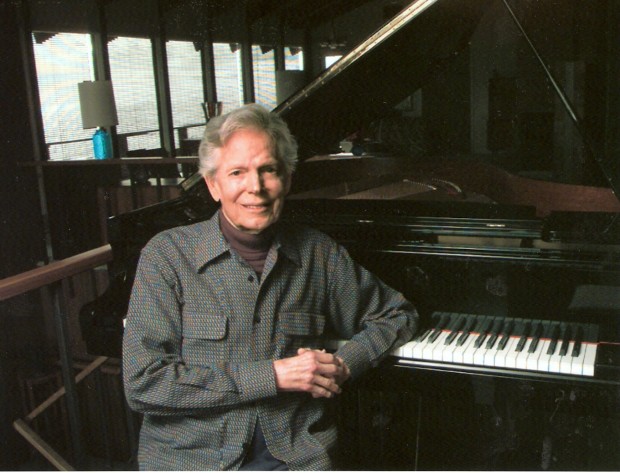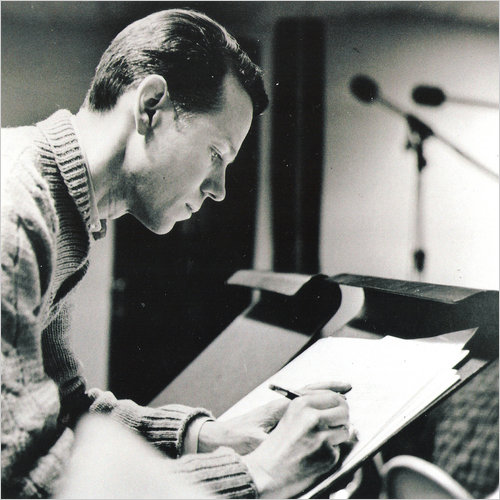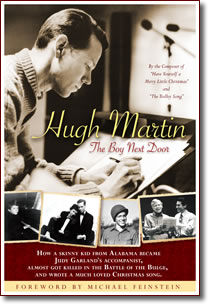Hugh Martin: ‘I said, 'Well, I'm sorry you don't like it, Judy, but that's the way it is, and I don't really want to write a new lyric.'‘He Truly Was The Boy Next Door’
Hugh Martin
Songs for Judy Garland, Yuletide and All-Time
August 11, 1914-March 11, 2011
Before songwriter Hugh Martin’s “Have Yourself A Merry Little Christmas” could become a Yuletide classic, it had to undergo a couple of significant makeovers--after Martin’s songwriting partner Ralph Blane saved it from the trash.
The song began with the melody, Martin said in a recent interview. “I found a little madrigal-like tune that I liked but couldn’t make work, so I played with it for two or three days and threw it in the wastebasket.”
Fortunately, Blane had heard the tune, and convinced Martin it was too good to toss out. “We dug around the wastebasket and found it,” Blane said. “Thank the Lord we found it.”
“Have Yourself a Merry Little Christmas” was one of three songs that jumped out of the Martin-Blane soundtrack for Vincente Minnelli’s 1944 film musical Meet Me in St. Louis to become movie classics, and was by far the most popular of those three. Set in 1903, the year before the St. Louis World’s Fair, the film’s story follows the four Smith daughters as they come of age. At the same time, the Smith family patriarch announces he is being sent to New York on business, and that the family will eventually move there, news that upsets everyone, especially sisters Rose (played by Lucille Bremer) and Esther (Judy Garland) for various reasons relating to budding romances and their own personal plans. Following an eventful Christmas Eve ball at which the love of her young life unexpectedly turned up and danced the night away with her, Esther returned home and sang “Have Yourself A Merry Little Christmas” to her distraught sister Tootie, played by Margaret O’Brien.
During filming, when time came for her to sing to Tootie, Garland she couldn’t sing the original tune as written to little Margaret. She found lyrics such as “Have yourself a merry little Christmas, it may be your last,” and “next year we may all be living in the past” and “faithful friends who were dear to us, will be near to us no more” too dark. She requested a revision.
"The original version was so lugubrious that Judy Garland refused to sing it,” Martin recalled in a 2006 interview on NPR’s Fresh Air show. “She said, 'If I sing that, little Margaret will cry and they'll think I'm a monster.' So I was young then and kind of arrogant, and I said, 'Well, I'm sorry you don't like it, Judy, but that's the way it is, and I don't really want to write a new lyric.' But Tom Drake, who played the boy next door, took me aside and said, 'Hugh, you've got to finish it. It's really a great song potentially, and I think you'll be sorry if you don't do it.' So I went home and I wrote the version that's in the movie."
Martin more upbeat revision: “Have yourself a merry little Christmas, let your heart be light; next year all our troubles will be out of sight.”
Judy Garland and Margaret O’Brien, ‘Have Yourself a Merry Little Christmas,’ from Meet Me In St. Louis, written by Hugh Martin and Ralph Blane.Released in the midst of World War II, the song was immediately embraced by moviegoers and in the succeeding years became a beloved Christmas standard, its soothing melody, easygoing tempo and hopeful sentiments buoying the spirits of a country rocked by war at the time the song made its debut, and in the post-war years sounding a calming, life affirming seasonal note in the midst of various domestic crises.
But Martin wasn’t finished reworking the song. In 1957, Frank Sinatra was cutting his first full Christmas album, A Jolly Christmas, and requested that Martin add a bit more pep to the song before he recorded it. The simple solution: changing “until then we’ll have to muddle through somehow” to “hang a shining star upon the highest bough.”
“Have Yourself a Merry Little Christmas” has been covered more than 500 times. Asked on Fresh Air which versions stand out for him, he identified a cover by the cartoonish ‘80s metal band Twisted Sister as “the strangest version I heard,” but added that his preferences were for the older renditions.
“Judy Garland, of course, [was] always tops with me,” he said, “And Mel Torme, who wrote a beautiful new verse for it, was really out of this world. And Frank Sinatra—you can't beat 'Mr. Blue Eyes.'"
Thought not as seasonally ubiquitous as “Have Yourself a Merry Little Christmas,” two other Hugh Martin songs for Meet Me In St. Louis, “The Trolley Song” and “The Boy Next Door,” were huge favorites with the public. “The Trolley Song” was nominated for an Academy Award for Best Original Song.
Judy Garland, ‘The Trolley Song,’ from Meet Me in St. LouisMartin died on March 11 of natural causes in Encinitas, CA. He was 96. In addition to the Meet Me in St. Louis songs, Martin also wrote “The Boy Next Door” and “Pass That Peace Pipe,” which was nominated for the Academy Award for Best Original Song from the 1947 movie Good News. He received four Tony Award nominations, three for High Spirits (Best Musical, Best Book Author of a Musical, Best Composer and Lyricist) and one for the 1990 stage version of Meet Me in St. Louis (Best Original Score).
Hugh Martin at work on a scoreBorn in Birmingham, Alabama on August 11, 1914, Hugh Martin began studying music at the age 5 at the Birmingham Conservatory of Music. He attended Birmingham. Southern College and his original intention was to be a classical musician, but he had fallen in love with George Gershwin's songs, and decided on a career in popular music.
“’Rhapsody in Blue’ changed my life,” he stated in an interview with singer/pianist/pop music historian Michael Feinstein in liner notes for their 1995 album, The Hugh Martin Songbook. “It was Gershwin and Kern and Arlen. Those three were my top-echelon people.”
Moving to New York City in the mid 1930s, Martin worked as a vocal arranger for many of the most successful Broadway shows of the period, including Cole Porter's DuBarry Was a Lady (1939), Vernon Duke's Cabin in the Sky (1940), Rodgers and Hart's The Boys from Syracuse (1942), Jules Styne's High Button Shoes (1947), and Jules Styne's Gentlemen Prefer Blondes (1949).
Judy Garland, ‘The Boy Next Door,’ one of the triumvirate of classics from Meet Me in St. LouisIn 1937, in addition to doing the show's vocal arrangements, he was a singer in the Broadway production Hooray For What?. Another singer in that show was Ralph Blane. Not long after the opening of the show, Martin organized a vocal quartet called The Martins, and included Blane as one of the singers. The Martins appeared on Fred Allen's popular radio show and also appeared in Irving Berlin's 1940 musical Louisiana Purchase, for which Martin and Blane were the vocal arrangers.
Soon, Martin and Blane began collaborating on songs of their own, and in 1941 Richard Rodgers and George Abbot chose Martin and Blane to write the songs for a new Broadway musical to star Nancy Walker. The show was called Best Foot Forward, and included the standards "Buckle Down Winsocki", "Wish I May,” "What Do You Think I Am,” "That's How I Love The Blues" and "Ev'ry Time,”
Following their 1944 success with Meet Me In St. Louis, Martin and Blane wrote "Love" for Lena Home to sing in the 1945 film Ziegfield Follies. In 1948, working alone, Martin wrote both words and music for the Broadway show Look Ma, I'm Dancin'. The show starred Nancy Walker and included the songs "Tiny Room" and "If You'll Be Mine.” In 1951 he again worked alone on both words and music for another Broadway show Make a Wish, which included "What I Was Warned About.”
Re-teaming with Blane in 1955, the two wrote the song “An Occasional Man” for the film The Girl Rush. In 1961, a revival of Best Foot Forward featured a new Martin-Blane song, “You Are For Loving.”
Gloria DeHaven, ‘An Occasional Man,’ by Hugh Martin and Ralph Blane, for the 1955 Robert Pirosh-directed film The Girl Rush, starring Rosalind Russell, Fernando Lamas, Eddie Albert and Ms. DeHaven.In 1964, Martin began collaborating with songwriter Timothy Gray. The two produced a new Broadway musical, High Spirits, based on a Noel Coward play Blithe Spirits. The musical was a hit and included several acclaimed songs, most notably “I Know Your Heart,” "If I Gave You" and "You'd Better Love Me.”
Throughout his career, Martin remained active as a performer, most memorably as Judy Garland's accompanist when she first played the Palace, and as Eddie Fisher's accompanist at London's Palladium. He was also music director of the 1979 Broadway hit Sugar Babies, which starred Mickey Rooney.
Martin retired to Encinitas, CA, in the early 1970s, but continued to create and entertain until his passing. He autobiography, Hugh Martin, The Boy Next Door, was published by Trolley Press this past October.
He was preceded in death by his father, Hugh Martin, Sr., his mother, Ellie Gordon Martin, and his sister, Ellen Martin Hanners. He is survived by his brother, Gordon Martin, his nephews, Gordon Martin, Jr., and Hugh Martin, III of Birmingham, AL, his nieces, Lua Martin Wells of Mount Pleasant, SC, and Suzanne Hanners of Cincinnati, OH, and his longtime manager and dearest friend, Elaine Harrison of Encinitas, CA. His collaborator, Ralph Blane, passed away in 1995.
“Our family was blessed to have Uncle Hugh in our lives. Not only was he an amazing and talented, musician and composer, but the most caring and thoughtful man you’ll ever meet. He was adored by family and friends and respected and loved by colleagues. He had such grace and class. He truly was ‘the boy next door’,” said his niece Suzanne Hanners.
Hugh Martin’s autobiography, The Boy Next Door, is available at www.amazon.com
Founder/Publisher/Editor: David McGee
Contributing Editors: Billy Altman, Laura Fissinger, Christopher Hill, Derk Richardson
Logo Design: John Mendelsohn (www.johnmendelsohn.com)
Website Design: Kieran McGee (www.kieranmcgee.com)
Staff Photographers: Audrey Harrod (Louisville, KY; www.flickr.com/audreyharrod), Alicia Zappier (New York)
E-mail: thebluegrassspecial@gmail.com
Mailing Address: David McGee, 201 W. 85 St.—5B, New York, NY 10024





